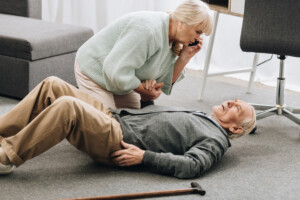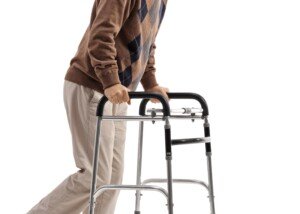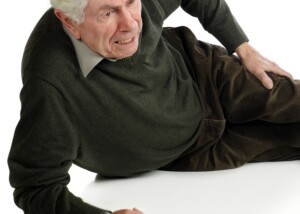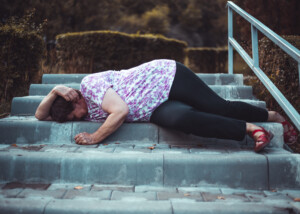Does your elderly parent continue to angrily deny his or her high risk of a fall?
What makes this denial even more puzzling is when the senior age person seems to be quite lucid and high functioning in other areas of life.
And perhaps that’s the problem. A person over age 65 who, for instance, is adept at using a computer and playing bridge may be more likely to deny a high fall risk, believing that only those with cognitive impairment or bad vision would be at risk for an injurious fall.
“Perhaps it seems to be a paradox, but life is full of situations in which people ‘know’ they should behave in one way, yet they actually do another (everything from exercise and losing weight to drinking too much to preventive maintenance on a car),” says Raymond L. Ownby, MD, PhD, MBA, Professor and Chair, Department of Psychiatry and Behavioral Medicine, Nova Southeastern University. Dr. Ownby specializes in the mental health of older adults.
“So it’s actually not an uncommon problem; people often don’t do what they should do, but rather, do what’s most expedient at the moment the behavior occurs,” continues Dr. Ownby.
“Just as someone knows they should lose weight, but might choose to have a second helping of a rich dessert, your hypothetical 85-year-old ‘knows’ that it’s risky to not use the cane or walker, but may still choose to move around without it because it’s easier — and at that moment they decide it’s unlikely that they will fall.”
Reasoning with a High Fall Risk Older Person May NOT Be Futile
A common objection by the senior citizen might be, “Oh, I don’t need my cane, it’s only a few steps.”
What’s the best response by the worried adult child or spouse to this objection?
You should point out that it takes only ONE step to lead to a fall.A fall is not the result of many steps.It’s the result of something going wrong with ONE step.
The motto is: “One step is all it takes. If your journey is only five steps, there are five opportunities to take a fall. That’s a lot.”
Dr. Ownby explains, “A critical issue is the way people think about risk. Because accidents and falls happen relatively rarely but require continuing effort to prevent, people often neglect the things that can ensure their safety.”
This applies to younger people, e.g., those who refuse to wear a seatbelt or who leave their car running while dashing into a convenience store for one item.
“It’s similar for the elder who chooses not to use the walker because ‘it’s just a few steps.’”
Denying a Fall Risk but not Other Medical Issues
“A key factor is the older person’s desire to maintain their independence and perhaps most importantly their self-image as independent and competent,” points out Dr. Ownby.
The irony with this kind of thinking is that the elderly man or woman, who keeps denying their fall risk and keeps making excuses, comes across as ANYTHING but competent.
When that aged person insists, “I won’t fall; I’ll just catch myself,” or, “I’ll grab onto the car if I start falling,” they hardly come across as possessing a high level of executive thinking.
Go ahead, point this out to your elderly parent. It just might give them pause.
“Using a walker or wearing a Life Alert pendant has a very specific meaning for many elders far beyond the basic reason for using them,” says Dr. Ownby.
“They are indications of a decline in function, loss of independence, and one sign on the road to further decline, disability, dependence and ultimately death.”
You should point out that further decline and disability can easily result from a fall, like a fractured hip!
Tell your senior age parent that they’re already making concessions due to their age, such as taking more or longer naps, taking a new medication, inspecting their bowel movements, cutting back on salt, upgrading their eyeglass prescription, etc. Why not add one more concession (fall prevention tactics) to this list?
“Basically, no one wants to look like (or be) a helpless old person,” says Dr. Ownby.
“We’re surrounded with negative stereotypes of aging, and people will spend large sums of money to cover up its signs.
“Other researchers have looked at this issue as one of stigma; and if being old is stigmatized, then it’s easy to understand why someone doesn’t want to see themselves in that light or mark themselves in this way.”
The sad fact is that many elderly men and women who are at risk for falls can see this risk in their peers, but fail to see it in themselves.
And even when they finally take a hard fall…they may still be in denial, blaming the mishap on a slippery floor.
 Dr. Ownby has a special interest in cognitive aging, memory, psychiatry, neuropsychology and neuropsychological assessment.
Dr. Ownby has a special interest in cognitive aging, memory, psychiatry, neuropsychology and neuropsychological assessment.
 Lorra Garrick is a former personal trainer certified through the American Council on Exercise. At Bally Total Fitness she trained women and men of all ages for fat loss, muscle building, fitness and improved health.
Lorra Garrick is a former personal trainer certified through the American Council on Exercise. At Bally Total Fitness she trained women and men of all ages for fat loss, muscle building, fitness and improved health.
.










































